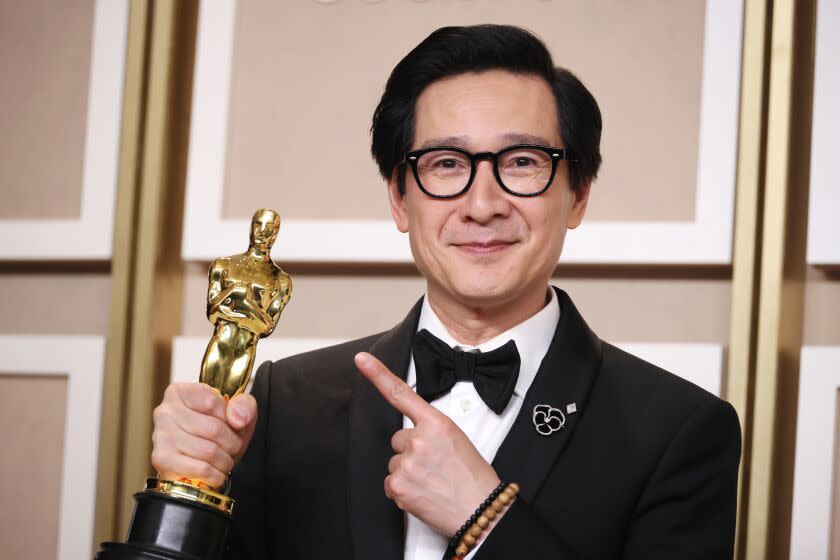'Everything Everywhere's' Ke Huy Quan wins Oscar for supporting actor

- Oops!Something went wrong.Please try again later.
- Oops!Something went wrong.Please try again later.
- Oops!Something went wrong.Please try again later.
- Oops!Something went wrong.Please try again later.
Ke Huy Quan really did win almost everything, everywhere this awards season, culminating Sunday with the Oscar for best performance by a supporting actor.
"My mom is 84 years old and she's at home watching," said the 51-year-old actor, already crying as he mounted the stage. "Mom, I just won an Oscar!"
The win was only the second for an actor of Asian descent in the category (Quan is of Vietnamese and Han Chinese extract), following the late Cambodian American Haing S. Ngor’s 1984 triumph for "The Killing Fields." Quan bested fellow nominees Brendan Gleeson ("The Banshees of Inisherin"), Brian Tyree Henry ("Causeway"), Judd Hirsch ("The Fablemans") and Barry Keoghan ("The Banshees of Inisherin").
In "Everything Everywhere," Quan demonstrates impressive versatility. He plays several variants of the protagonist's (played by Michelle Yeoh) husband throughout the multiverse — hardworking and dull ordinary guy; courageous martial-arts warrior; suave, high-society sophisticate. He had to fit into multiple genres, including absurd action comedy, family drama and something like a Wong Kar-Wai romance.
He has been a favorite at awards ceremonies this season, winning over audience after audience with his unguarded, charming acceptance speeches — as at the SAG Awards, where he said through tears: "This is a really emotional moment for me. I recently was told that if I were to win tonight, I would become the very first Asian actor to win in this category. When I heard this, I quickly realized that this moment no longer belongs to just me, it also belongs to everyone who has asked for change."
Before the Oscar, Quan collected no fewer than 60 awards for the performance; among major associations, only BAFTA had denied him, giving its award to Keoghan.
After debuting at age 12 alongside Harrison Ford in "Indiana Jones and the Temple of Doom" (1984) as Indy's sidekick Short Round, Quan's next most prominent role came the following year in "The Goonies." He appeared sporadically in film and television after that. Acting roles dried up for him in the mid-’90s.
"I didn’t go looking to be an actor; acting found me. To work with Steven Spielberg, George Lucas and Harrison Ford on your first movie. … There was nowhere to go but downhill," he told Randee Dawn for The Times last year. "I think that’s why, when I got older and the road became rugged, I felt like I didn’t pay my dues. I started questioning myself when the phone stopped ringing and the opportunities dried up."
Giving up on acting, Quan studied film at USC and became a producer and fight choreographer (including working with legendary martial-arts filmmaker Corey Yuen), producing and shooting the short "Voodoo" (directed by his friend Gregg Bishop), which went on to win the Slamdance Film Festival's audience award.
He never got over the acting bug, though, and has said the success of "Crazy Rich Asians" in 2018 spurred him to get back in the game. He got a new agent and soon after landed "Everything Everywhere."
"The reason I got so discouraged was every time there was an opportunity to audition — not an offer, but an opportunity — it was always for minor roles. Very stereotypical, marginalized," he told The Times. "Now we have shows on prime-time television with an entire Asian cast, and there’s 'Everything Everywhere All at Once.'
"For many years, I just had to be realistic. Now, I don’t have to be only realistic. I can also be optimistic."
As Quan proclaimed in his acceptance speech, looking back on his road to the Oscars stage: "Dreams are something you have to believe in. I almost gave up on mine. To all of you out there, please keep your dreams alive."
This story originally appeared in Los Angeles Times.

